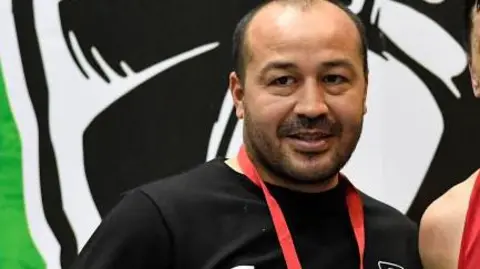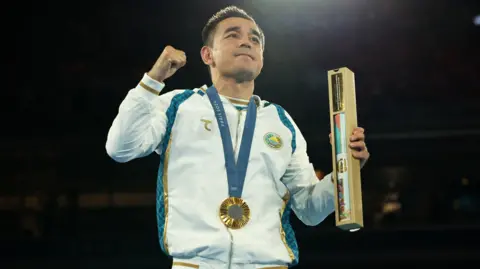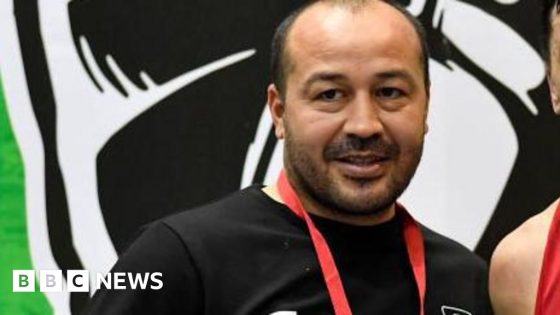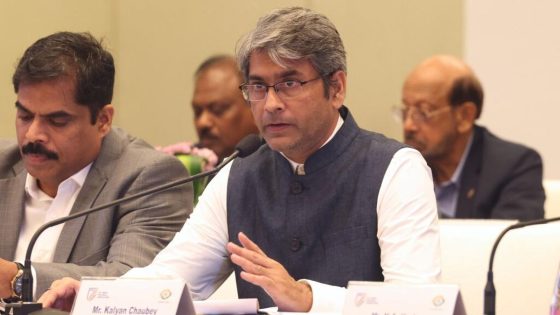 Getty Images
Getty ImagesTwo members of Team GB’s medical team have helped save the life of the Uzbekistan Olympic boxing team’s head coach.
Tulkin Kilichev was celebrating a gold medal for Uzbek boxer Hasanboy Dusmatov in the warm-up area at Roland Garros in Paris on 8 August when he went into cardiac arrest.
Team GB physiotherapist Robbie Lillis, who was in the arena at the time, said there was “a cry for a doctor” prompting him and colleague Dr Harj Singh to rush over to perform CPR and use a defibrillator.
Mr Kilochev is understood to be in a stable condition in hospital.
Mr Lillis said Uzbekistan’s coaching team were celebrating Dusmatov’s gold medal in the 51kg category before he heard shouting coming from the warm-up area that did not sound like celebrations anymore.
“There was a cry for a doctor, for help. Harj was the first person who responded and I followed with the emergency trauma bag that we carry with us,” he told the PA news agency.
The physiotherapist said he reached Mr Kilichev “about 30 seconds after Harj”, who had already started performing CPR – an emergency lifesaving procedure performed when someone’s heart stops beating.
“Quite a lot of coaches were pretty visibly distressed around the whole situation, so it took us a moment to clear all of them out of the way,” he said.
Mr Lillis said he used a defibrillator on Mr Kilichev, which gives a jolt of energy to the heart to help restore a normal heartbeat.
“Initially he didn’t come back but, about 20 to 30 seconds later, after Harj continued doing CPR, all of a sudden he came back conscious with us, which was great.”
 Reuters
ReutersThe venue’s medical team arrived a few minutes later and Mr Kilichev was taken to hospital, where he is understood to be in a stable condition.
Mr Lillis said he hopes the Uzbekistan boxing coach makes a “full recovery”.
“I’m very, very thankful that we did have all the equipment on us, and myself and Harj being there and being trained,” he said.
‘That’s your Olympic moment’
Mr Lillis admitted he did not sleep at all on Thursday night following the incident.
“It was obviously a bit of a rush of adrenaline at that time kind of managing the situation,” he said. “I’m obviously grateful to be able to play a part in hopefully helping someone survive.
Mr Lillis said his mum told him “that’s your Olympic moment”.
“It’s something obviously I’ll definitely remember, I don’t think I’m going to be forgetting that any time soon.”
Mr Singh, who also teaches pre hospital emergency skills, said that the situation “puts things into perspective”.
“At some stage we will endeavour to go to the hospital,” the doctor said. “If it could be arranged, I think that would be quite emotional for both of us.”
What are the signs of cardiac arrest?
The signs someone has gone into cardiac arrest include if they are not moving, responding to any stimulation, or appear not to be breathing, according to the NHS.
The NHS said symptoms include:
- Chest pain – it may include a feeling of pressure heaviness, tightness or squeezing across the chest.
- Pain in other parts of the body – which can feel as if it’s spreading from the chest to arms, jaw, neck, back, and abdomen.
- feeling lightheaded or dizzy
- sweating
- shortness of breath
- feeling or being sick
- an overwhelming feeling of anxiety
- coughing or wheezing
Source Agencies





